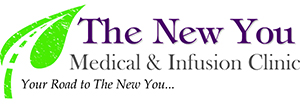Postpartum Depression Treatment in Sunnyvale, TX
 Giving birth to a healthy child is meant to be a joyous occasion. For many mothers, however, the period after a child is born can become something else entirely. Postpartum depression is a legitimate medical condition that affects mothers worldwide.
Giving birth to a healthy child is meant to be a joyous occasion. For many mothers, however, the period after a child is born can become something else entirely. Postpartum depression is a legitimate medical condition that affects mothers worldwide.
Request more information about postpartum depression treatment today: call (817) 203-2760 or contact The New You Medical & Infusion Clinic online.
Symptoms of Postpartum Depression
In the past, many people referred to postpartum depression as the “baby blues.” As medical science has advanced, however, doctors now understand that postpartum depression can cause much more than simple sadness.
Some amount of “baby blues”, which is not postpartum depression itself, is completely normal. Some of these symptoms are to be expected after pregnancy and will likely subside in a short amount of time:
- Minor sadness
- Irritability
- Sleep troubles
Postpartum depression goes far beyond that. Some of the most common postpartum depression symptoms include:
- Extreme sadness
- Crying
- Insomnia
- Loss of appetite
- Low sex drive/ low libido
- Severe mood swings
- Emotional distance
- Intense anxiety
Some mothers dealing with postpartum depression even have thoughts of self-harm or harming the baby. If this occurs, get medical help immediately. A rarer form of postpartum depression is postpartum psychosis. In this extreme condition, symptoms can include hallucinations, delusions, paranoia and self-harm attempts.
Causes of Postpartum Depression
There are many different factors that can contribute to developing postpartum depression. These can include:
- Hormone imbalance
- Immune system adjustments
- Intense stress
- General anxiety
In addition, certain mothers are more likely to suffer from postpartum depression due to their medical history or other risk factors. Problems that increase postpartum depression risk include:
- History of depression
- Postpartum depression during a previous pregnancy
- High-stress job or family situation
- Pre-existing mental health disorder
Postpartum Depression Treatment
Most treatment for postpartum depression is comprehensive, seeking to address the issue at its source. Most treatment plans begin with a discussion of symptoms and problems that the mother is currently facing.
If postpartum depression is determined to be present, potential treatment includes:
- Antidepressant medication: For some others, medication may be right course of treatment. Most antidepressant medication seeks to address the brain chemistry issues that may be leading to the depression.
- Hormone therapy: A large drop is estrogen typically occurs after childbirth. This can lead to postpartum depression. One possible treatment for this issue is hormone replacement therapy .
- Counseling: Many women find positive benefit in discussing their postpartum depression issues with a counselor, therapist, psychiatrist or psychologist and using cognitive behavioral therapy .
Request More Information Today
Ultimately, the only way to determine what postpartum depression treatment is right for your needs is to contact a medical professional. Request more information today: call (817) 203-2760 or contact The New You Medical & Infusion Clinic online.
The New You Medical & Infusion Clinic
Address
100 Grapevine HwyHurst, TX 76054
(817) 203-2760
https://www.newyoumedclinic.com/
Hours
Mon:
10:00 am - 6:00 pm
Tue:
10:00 am - 6:00 pm
Wed:
10:00 am - 6:00 pm
Thu:
10:00 am - 6:00 pm
Fri:
Closed
Sat:
Closed
Sun:
Closed

